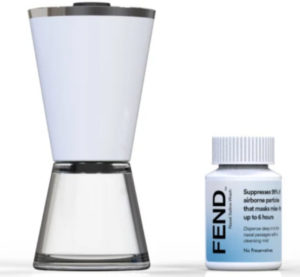
David Edwards, Ph.D.
AIMBE College of Fellows Class of 2002 For invention, development and commercialization of a novel aerosol drug delivery system, jointly with his outstanding engineering science research scholarship.
Researchers unravel what makes someone a COVID-19 super-spreader
Via Tulane University | February 9, 2021Scientists and public health experts have long known that certain individuals, termed “super-spreaders,” can transmit COVID-19 with incredible efficiency and devastating consequences.
Now, researchers at Tulane University, Harvard University, MIT and Massachusetts General Hospital have learned that obesity, age and COVID-19 infection correlate with a propensity to breathe out more respiratory droplets — key spreaders of SARS-CoV-2, the virus that causes COVID-19. Their findings were published in Proceedings of the National Academy of Sciences… Continue reading.
David Edwards develops a $50 nasal spray to thwart the spread of COVID-19
Via Fast Company | July 8, 2020Developed by Harvard professor David Edwards—who previously created inhalable chocolate and cocktails—the spray promises to stop the spread of aerosols by as much as 99%.
 You should practice social distancing and wear a mask to prevent the spread of COVID-19. But even masks aren’t perfect. A high-end N95 mask can filter an estimated 99.8% of the virus from the air, while many cotton masks filter just 50% or less. Given that researchers now know the virus is airborne, you may wonder: Is there anything else you can do to prevent the spread of COVID-19?
You should practice social distancing and wear a mask to prevent the spread of COVID-19. But even masks aren’t perfect. A high-end N95 mask can filter an estimated 99.8% of the virus from the air, while many cotton masks filter just 50% or less. Given that researchers now know the virus is airborne, you may wonder: Is there anything else you can do to prevent the spread of COVID-19?
According to David Edwards, a Harvard professor and entrepreneur, there is. And it’s not much more complicated than sniffing a specialized saline solution. “It’s cleaning my bioaerosol footprint, if you will,” he says.
With his company Sensory Cloud, Edwards has developed a $50 product that has two components: the Nimbus and FEND. The Nimbus is an aerosol squirter, capable of turning liquid into a cloud of vapor that you puff in front of your nose to inhale from the air. FEND is a solution that goes inside the squirter, composed of a mix of salts similar to seawater… Continue reading.
Engineering Future Health Solutions is Focus of Ashland Lectures
Via U. Kentucky | March 31, 2015LEXINGTON, Ky. (March 31, 2015) — As part of the University of Kentucky College of Engineering’s commitment to bring the best intellectual minds and research creativity to campus, the 2015 Ashland Inc. Distinguished Lecture Series will feature two experts, David Edwards and Kinam Park, who are developing novel techniques for sensory and drug delivery.
Famous for inventing new ways of eating, communicating and transporting water, Harvard Professor David Edwards founded Le Laboratoire, a Paris-based research and innovation facility merging science and the arts. His work also includes new approaches to treating infectious diseases.
Edwards is the Gordan McKay Professor of the Practice of Idea Translation in the Harvard School of Engineering and Applied Science, a core member of the Wyss Institute for Biologically Inspired Engineering, and a faculty associate of the Center for Nanoscale Systems.
He has launched multiple drug delivery companies and nonprofits, is the author of two seminal textbooks in applied mathematics, as well as several works of nonfiction and fiction, and is a member of the American and French National Academies of Engineering and the U.S. National Academy of Inventors. Edwards has won many international awards and honors, including his nomination as Chevalier of Arts & Letters by the French Ministry of Culture.
Edwards will deliver his lecture, “Sensory Delivery for Better Health,” at 9:15 a.m. in the Young Library auditorium.
Frozen Yogurt in a Shell, No Packaging Required
Via Fast Company | August 22, 2014For years, Harvard University professor David Edwards has worked to create edible food packaging designed to mimic the way nature creates fruit and vegetables inside edible skins. One of his creations, the WikiPearl, is now available for public consumption.
In 2012, Edwards turned his passion into a company, called WikiFoods. One of his nature-inspired food technologies, WikiPearl, has been a major focus. At a basic level, WikiPearl is a skin–a protective coating for food that prevents contamination and water loss. On the WikiPearl website, there are images of all kinds of foods encased in WikiPearl skins, including ice cream, yogurt, and cheese.
Now, collaborating with Stonyfield Farms, WikiFoods has created a line of frozen yogurt, called Stonyfield Frozen Yogurt Pearls, that consists of an edible skin (peach, coconut, or strawberry flavored) surrounding chocolate frozen yogurt.
In an interview with Co.Exist two years ago, Edwards explained his WikiPearl vision: "The notion [of Wikicells] is that you are englobing liquid, foam, or something else in a soft membrane held together by food particles that are being connected by electrostatic charges to each other and to a small amount of natural polymer."
 AIMBE
AIMBE
